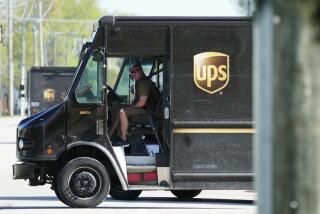U.S. railroads are on a recruiting drive
- Share via
BOONE, IOWA — The hours are irregular and the work means long days away from home, but 22-year-old Brady Foster is following in his father’s footsteps and signing on with the railroad.
The need for young workers such as Foster is enormous as thousands of baby boomers retire at a time when railroad companies are seeing a surge in business. The companies are stepping up recruitment, targeting Iraq war veterans and laid-off factory workers.
“I saw one of my dad’s paychecks and I decided that was for me,” said Foster, who chose a career with Union Pacific Railroad Co. over teaching.
The pay is good -- up to $40,000 at Union Pacific in the first year.
But workers also must endure never-ending traveling as well as night, weekend and on-call schedules.
Omaha-based Union Pacific, the nation’s largest freight carrier, will hire about 6,000 employees this year, said Roy Schroer, assistant vice president for human resources.
“Our hiring needs have grown dramatically,” Schroer said. “I think generally forecasts would say, assuming a level economy or a strong economy, we’re going to have the need to hire at least 5,000 people a year for the next several years.”
The hiring is a marked change from the 1980s, when the railroad industry was in a rapid consolidation. Union Pacific, for example, is the product of seven mergers in the last 27 years.
As a result, many railroad companies haven’t hired many people until the last few years as demand increased and workers neared retirement. They now find themselves with lots of employees in their 40s, 50s and 60s, said James Barnes, a Union Pacific spokesman.
Burlington Northern Santa Fe Corp., the nation’s second-largest freight railroad, faces a similar problem.
“The whole rail industry is an early precursor of the retirement wave baby boomers will cause in many segments of the U.S. economy,” said Steven Forsberg, a spokesman for Fort Worth-based Burlington Northern.
By the end of 2006, Burlington Northern will have hired more than 14,000 people over the last four years, he said.
Overall employment has increased from about 36,500 in 2003 to more than 40,000, he said in a statement.
Most of those hires replaced retiring workers, but some were needed because of record volume on the rail line, Forsberg said. Business has boomed for railroads as many companies have shifted transportation from trucks to the more efficient rail, largely over fuel price increases.
The Assn. of American Railroads said freight demand was expected to drive the need for more than 80,000 new workers over the next six years.
The jobs typically pay well. At Union Pacific, an employee can become a train engineer within three to five years at a salary of $75,000. The unionized industry also offers good benefits, and workers with 30 years of service can retire at age 60.
Many rail workers are hired with little or no education beyond a high school diploma, so many start young and retire early.
Just a few months into his new job at Union Pacific, Foster was training at the company’s rail yards here in Boone, where 500 of the company’s 49,500 employees work.
Training has included several weeks of classroom work and memorizing a 500-page book that includes federal regulations, company rules and safety standards.
Pat McGovern, a conductor and former manager in Chicago, moved to central Iowa to be an instructor.
He said the work wasn’t for everyone.
“A few people are book smart, but they get out here and they’re afraid of the equipment. It’s huge,” he said. “After three weeks, you can tell whether they’re going to make it or not.”
More to Read
Sign up for Essential California
The most important California stories and recommendations in your inbox every morning.
You may occasionally receive promotional content from the Los Angeles Times.













